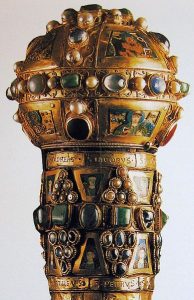
Life is boring.
History might be understood as a story of humans trying to survive, explain the world around them, and escape from the monotony of it all. From storytelling to athletics to art, we humans have been livening things up for thousands of years. Are the legions of teens tuning into their favorite YouTubers every week all that much different from the crowds filling the Athenian agora to listen to a traveling Homeric poet? Indeed, for some (including yours truly), history itself can serve as an escape, providing tales of times so much more interesting than the times one lives in. For me, this phenomenon has added a second, flipped, meaning to the old adage that “The past is like a foreign country.” Sure, they do things differently there, but I also couldn’t imagine those things happening here, either. Recently, however, I realized that this mindset forms the very foundation of one of the most popular video game series of the last two decades: Assassins’ Creed.
For those unfamiliar with Assassins’ Creed, the video game franchise tells the story of an epic clash between secret organizations throughout history. One, the Templars, works behind the scenes to deprive humanity of free will in order to serve the higher purpose of order and prosperity. The other, the titular Assassins, seek to preserve humanity’s individuality and diversity. Though named for their most famous medieval incarnations, these two organizations have existed for almost all of human history, and players gain snapshots of the conflict through the eyes of participants from ancient Greece and Egypt through the Renaissance and early modern period all the way up to present day. The games are meticulously well-researched, and indeed my old art history professor at Gettysburg would use Assassins’ Creed II (set in 15th-century Florence) as a teaching aid in her Renaissance class. There is, however, one decidedly ahistorical element of these games: aliens.
No, I’m not kidding you. The foundation of Assassins’ Creed storytelling is the existence of a pre-human race on Earth that has served as inspiration for most human religions and forged a number of advanced technological artifacts that have steered the course of human history. It is these artifacts that the Templars and Assassins have fought over, even while misunderstanding their purpose. At first glance, this seems like yet another science-fiction tale, but as I made my way through the fourth game recently (Assassin’s Creed: Revelations, set in early 16th-century Constantinople), it gave me serious pause. When faced with stories like this, it is natural to speculate what major events involved “Pieces of Eden,” as they’re known. In Assassins’ Creed, the answer appears to be “All of them.” Leonidas, Julius Caesar, the Papacy, Ghengis Khan, George Washington, Nikola Tesla, FDR, JFK, and more either had access to or personally wielded these artifacts.
In short, every example of human ingenuity, expansion, and savagery can be traced back to magic. As I delved deeper, I couldn’t help but be put off. Just like Ancient Aliens and so many abominable cult television and movies, Assassins’ Creed seemed to be saying that humanity just isn’t capable. Humans weren’t capable of discovering electric current on their own. No mere human could have bloodily conquered the largest land empire the world has ever seen in the space of a generation. We are but mortals, and to do these things, we needed the power of gods.
I can think of no more offensive or, frankly, dangerous statement to a historian. It deprives the past of all wonder, inspiration, and horrific deterrence. Of course, Assassins’ Creed is only a story (if a compelling one), but in this age of elusive fact and false revision, I feel it is all the more important to appreciate the full range of what we, as humans, are capable of.
Life is boring, but humanity never has been.